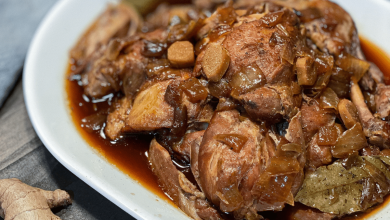Toasted Nori
Toasted Nori: A Delightful Seaweed Snack
Introduction:
Toasted Nori, also known as roasted seaweed, is a popular and nutritious snack made from dried sheets of seaweed. It is a staple in Japanese and Korean cuisines but has gained worldwide popularity due to its unique taste, crispiness, and health benefits. In this comprehensive response, we will explore what Toasted Nori is, delve into its history, examine its components, outline the steps to prepare it, and provide an estimate of the time needed for preparation.
What is Toasted Nori?
Toasted Nori refers to edible seaweed, specifically the species Porphyra, that has been harvested, processed, and toasted to create thin, delicate, and crispy sheets. These sheets have a savory umami flavor with a hint of sea salt, making them a versatile ingredient in various dishes and a popular snack.
History:
The history of using seaweed, including Nori, dates back centuries, primarily in Asian cultures. Here’s a brief overview of its historical significance:
-
Japan: Nori has a deep-rooted history in Japanese cuisine. It’s believed to have been consumed as early as the 8th century during the Nara period. Initially, Nori was used to wrap rice balls (onigiri) to keep them fresh, and this tradition evolved over time. In the Edo period (17th-19th century), it became more widespread and was used in sushi, leading to its association with this iconic dish.
-
Korea: In Korea, Nori is known as “gim.” Its use can be traced back over a thousand years, and it played a vital role in Korean cuisine, especially during the Joseon dynasty. Koreans also used it for wrapping rice and other ingredients, and it remains a fundamental component of various dishes.
-
Global Popularity: Over the last few decades, Toasted Nori has transcended its Asian origins and gained global recognition as a healthy and tasty snack. It’s now used in fusion cuisine and as a topping for salads, soups, and even as a seasoning for popcorn.
Components:
Toasted Nori sheets are remarkably simple in terms of ingredients. They are made from just a few components:
-
Seaweed (Porphyra spp.): The main ingredient is dried seaweed, specifically species of the Porphyra genus. These seaweeds are rich in nutrients, including vitamins, minerals, and antioxidants.
-
Salt: A small amount of salt is often added during the toasting process to enhance the flavor. It gives Nori its characteristic salty taste.
-
Oil: Sometimes a minimal amount of vegetable oil, such as sesame oil, is used to lightly coat the seaweed sheets before toasting. This helps in the toasting process and adds a subtle nutty flavor.
Steps to Prepare Toasted Nori:
Making Toasted Nori at home is a straightforward process. Here are the steps to prepare it:
Ingredients:
- Dried Nori sheets
- Salt (optional)
- Sesame oil (optional)
Instructions:
-
Prepare the Nori Sheets: Start with dried Nori sheets. They are usually available in packs at grocery stores. Ensure that the sheets are clean and free of any contaminants.
-
Cut the Sheets: If you prefer bite-sized pieces, you can cut the Nori sheets into smaller strips or squares using scissors.
-
Season (Optional): If you want to add extra flavor, you can lightly brush the sheets with sesame oil and sprinkle a pinch of salt on them. This step is entirely optional, as Nori already has a salty flavor.
-
Toast the Nori: Preheat a dry skillet or pan over medium heat. Place the Nori sheets, one at a time, onto the hot surface. Toast them for about 10-15 seconds on each side or until they become crisp and fragrant. Be careful not to over-toast, as it can make them bitter.
-
Cool and Serve: Remove the toasted Nori sheets from the pan and let them cool for a minute. They will become even crispier as they cool down. Once cooled, serve them as a snack or use them in various dishes.
Time Needed to Prepare Toasted Nori:
The time needed to prepare Toasted Nori is relatively short, making it a quick and convenient snack or ingredient for your dishes. In total, it takes approximately 15-20 minutes to prepare a batch of Toasted Nori, including the time for cutting, optional seasoning, and toasting.
In summary, Toasted Nori is a delightful and nutritious snack with a rich history in Asian cuisine. It is made from simple ingredients, primarily dried seaweed, and can be easily prepared at home in just a matter of minutes. Whether you enjoy it as a standalone snack or incorporate it into your favorite dishes, Toasted Nori offers a unique combination of flavor and health benefits that have made it a beloved food item around the world.
Nutrition Facts and Health Information for Toasted Nori:
Toasted Nori, also known as roasted seaweed, is not only a delicious snack but also a nutritious one. Here are the key nutrition facts and health information for Toasted Nori:
Nutrition Facts (Per 10g serving of Toasted Nori):
- Calories: Approximately 42 calories
- Protein: About 2 grams
- Carbohydrates: Around 6 grams
- Dietary Fiber: Roughly 1 gram
- Total Fat: Approximately 1.5 grams
- Saturated Fat: Less than 1 gram
- Monounsaturated Fat: Less than 1 gram
- Polyunsaturated Fat: Less than 1 gram
- Cholesterol: 0 milligrams
- Sodium: Approximately 110 milligrams
- Potassium: Around 90 milligrams
- Vitamin A: About 60% of the Daily Value (DV)
- Vitamin C: Approximately 4% of the DV
- Calcium: Roughly 3% of the DV
- Iron: About 15% of the DV
Health Information:
-
Low in Calories: Toasted Nori is a low-calorie snack, making it a suitable option for those looking to manage their calorie intake.
-
Source of Protein: It contains a moderate amount of protein, which is essential for tissue repair and overall body function.
-
Carbohydrates and Fiber: While it contains carbohydrates, the dietary fiber content is relatively low. However, this can be balanced by consuming it with fiber-rich foods.
-
Healthy Fats: Toasted Nori is low in total fat, and the fat it does contain is primarily unsaturated fats, which are considered heart-healthy.
-
Low in Cholesterol: It is naturally cholesterol-free, making it a heart-healthy choice.
-
Rich in Vitamins: Toasted Nori is particularly high in Vitamin A, which is essential for vision, skin health, and the immune system. It also contains a small amount of Vitamin C, contributing to overall health.
-
Mineral Content: It is a good source of iron, important for red blood cell production, and contains some calcium, which is crucial for bone health.
-
Low Sodium Option: While it does contain sodium, it is relatively low in comparison to many other snack options. However, individuals on sodium-restricted diets should consume it in moderation.
-
Antioxidants: Seaweeds like Nori are rich in antioxidants, which can help protect cells from damage caused by free radicals.
-
Iodine Content: Nori is a natural source of iodine, which is essential for thyroid health. However, excessive consumption of iodine-rich foods should be avoided.
Note: It’s important to consume Toasted Nori in moderation, as it can be relatively high in sodium. Also, individual nutritional needs may vary, so it’s advisable to consult with a healthcare professional or nutritionist for personalized dietary recommendations.








